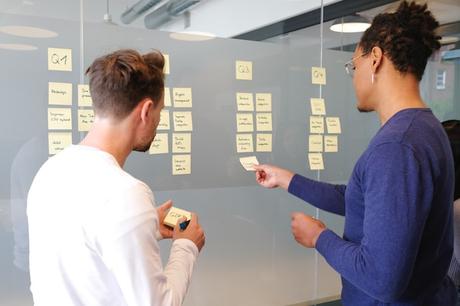
Workplaces are usually bustling environments filled with people of different opinions, interests, backgrounds, and roles. This makes them ideal spaces to work on your personal development skills.
Working on personal development skills at work can even make your day job more fulfilling. Getting involved with company culture or networking with your peers can make success at work that much more rewarding.
If you play your cards right, you may even be able to get personal development opportunities funded by your employer. Many employers are happy to help train employees and will be impressed by your desire to work on self-improvement.
Teamwork
Almost all work environments require you to be a team player. Whether it's making the morning coffee or collaborating on new company policy, being a team player makes your work environment a better place to be.
Start with simple acts of everyday kindness at work. Small acts like filling up a coworker's mug or bringing in some bagels on your way to work can help you create a kinder work environment. These small acts can quickly blossom into larger community-building projects as you get to know more people in your workplace.
It's important to remember that loose connections will advance your career, too. Loose connections, like those made over a shared loved for bagels or your work, will go the furthest when you want to make career moves.

Conflict Management
Teamwork and community-building initiatives are always rewarding. However, conflict does occur in the workplace, and you need to learn how to handle it in a professional, compassionate manner.
Try to see conflict as an opportunity to learn. It may be that you have to consider the perspective of your peers before you can understand what's got them so hot under the collar. If you assume you're in the right, you'll never give yourself a chance to encounter new perspectives and learn from them.
If you still need to handle ongoing conflict after considering your peer's perspective, try to calm them down first. No one makes rational decisions while they're angry, so do your best to listen and ensure that your coworker feels heard. When it's your time to speak, aim for the middle ground and slowly try to bring them around.
Above all, pride yourself on active listening while engaging in conflict management. Pay attention to what your peers are saying, and don't try to formulate answers until they've finished speaking. Let them know that you've heard what they're saying, and try to incorporate their own ideas and words into any answers you try to give.
It's important to recognize that not all conflicts have a happy ending. While you should do your best to hear and respond to your peers, you may need to practice some self-compassion and remove yourself from a conflict if it isn't serving your interests.
Self-Compassion
Self-compassion is an underrated personal development skill. Practicing self-compassion can help you feel more confident and boost your energy.
Self-compassion can improve your health, too. Fuschia Sirois, a psychologist at the University of Sheffield, explains that self-compassion can give you "a positive mood boost to make it easier to stay focused on your health goal." This insight is backed up by Sirois' research, which shows that people who practice self-compassion are "more likely to eat well, exercise regularly, get the recommended amount of sleep and keep their stress under control."

Start practicing self-compassion by analyzing your inner voice. Would you ever speak to a friend the way you speak to yourself? The answer is probably "no." So, be kinder to yourself, just as you are to those around you.
If you're having a hard time dissecting your inner voice, consider journaling. Start your journal with positive affirmations about yourself and the world around you. If you're struggling to record affirmations, try writing yourself a letter. Imagine a friend was in the same situation as you - what would you say to them to help turn the tide?
Speaking Up and Avoiding Burnout
It's hard to practice self-compassion if you're constantly burnt out and exhausted following your work week. However, many of us try to burn the candle at both ends and end up in a state of burnout. As many as 77% of employees have experienced burnout in their current workplace.
You can avoid burnout in your workplace by communicating with leadership and asking for help when you start to feel the first signs of exhaustion. Avoiding burnout is a company-wide effort, and requires cooperation from your employer. Suggest things like:
- Automate menial tasks
- New hires to ensure you leave on time
- Greater investment in wellness schemes
These changes may require a collaborative approach to defeating burnout, but speaking up is always a good idea if you start to feel your performance slipping due to exhaustion.
Conclusion
Your workplace is the ideal space to build personal development skills. While at work, you can build new connections, participate in company culture, and learn to deal with conflict. Just be sure to protect yourself by practicing conflict and addressing burnout before the point of exhaustion.
This guest post was authored by Ainsley Lawrence

Ainsley Lawrence is a writer who loves to talk about how business and professionalism intersect with the personal, social, and technological needs of today. She is frequently lost in a good book.
*******
Ms. Career Girl strives to provide valuable insights you can use. To see more from our columnists and guest authors, check these out! Or subscribe to our weekly email featuring our latest articles. We're also present on Medium!

Ms. Career Girl was started in 2008 to help ambitious young professional women figure out who they are, what they want and how to get it.

